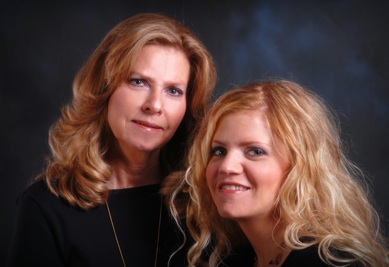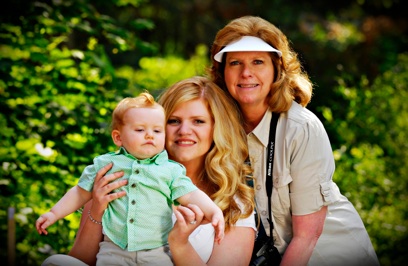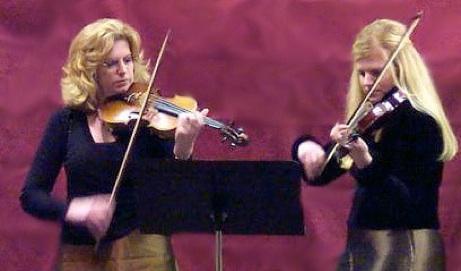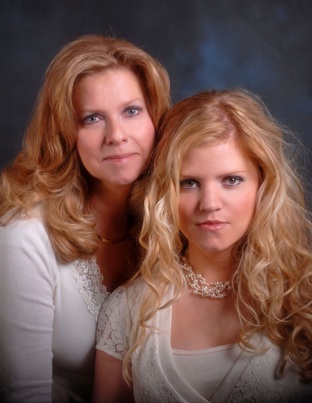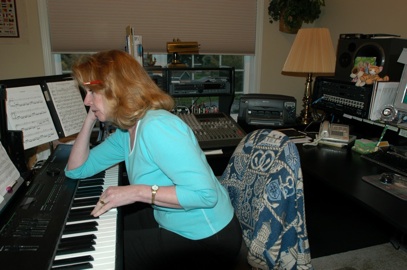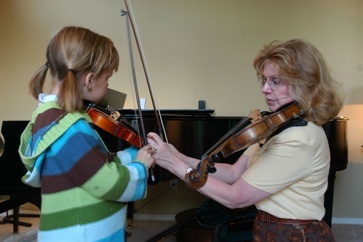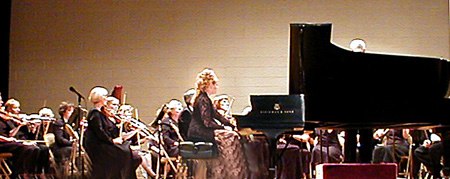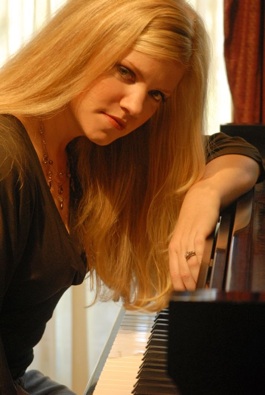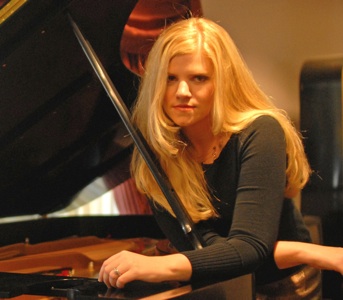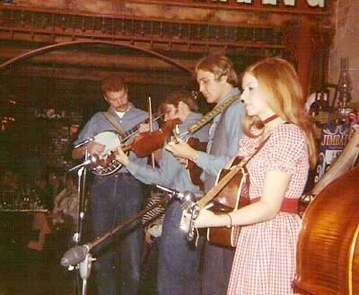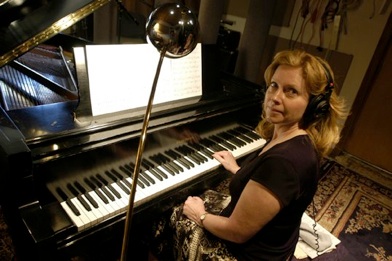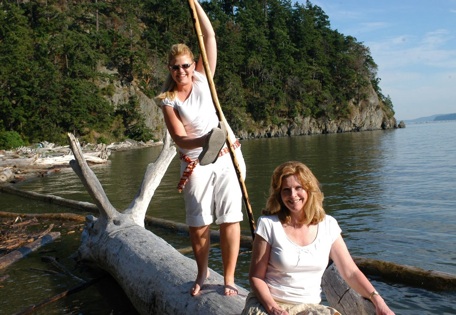The mother and daughter duo of Carolyn Southworth and Jennifer Thomas recently released a double CD called
The Lullaby Album. Each has independently released an exceptional CD (Carolyn’s
At the End of the Day and Jennifer’s
Key of Sea), and
The Lullaby Album allows both artists to really shine as pianists and as well as orchestrators. I think you’ll enjoy learning more about both women as artists and as people.
KP: What was the inspiration for The Lullaby Album?
JT: I seem to get my best ideas while taking long walks, and the idea came to me while I was out with my son, Preston, in the jogging stroller. Preston was a baby who didn’t fall asleep very well on his own and he would often wake up crying after only a short sleep. (I didn’t get much sleep those first several months of his life either!) I would put him in his swing close to the piano and make up lullabies for him. He would lay there calmly and watch me play. The accumulation of lullabies that I was creating for him led me to the idea of doing a lullaby album. It seemed like the perfect project to work on while I adjusted to new motherhood.
CS: To say Preston had a hard time going to sleep would be the understatement of the century! Bedtime was traumatic, and Jenni did everything she could think of to try to get Preston to sleep - he just wouldn’t cooperate. The only thing that seemed to calm him was when Jen quietly played the piano. She played a lot while she was pregnant, so I believe that Preston was used to hearing the piano, and it felt comfortable and familiar to him. Jenni thought that other young moms might be having similar difficulties, so she had the idea to record some piano lullabies. She called me one day and asked if I would like to collaborate with her on the project. My immediate answer was “of course!” We had talked about doing an album together for quite some time, but it was always in the “someday” stage.
KP: The music on the album is a fascinating combination of traditional folk songs, pop and classical music, and original compositions. How did you choose the songs?
JT: There were a few songs that I knew I wanted to “stake my claim” on since I had been arranging them and playing them for Preston, but beyond that, it was a process of researching lullabies and finding songs that would be a good fit. We each found songs that we wanted to arrange and compared notes. We decided to do six songs each. Toward the end of our project, Mom was hit with a huge wave of inspiration and wrote an extra song. I wanted to include a few popular songs so that the album would be appealing to a wider demographic. I conducted a poll on my blog and asked people what their favorite lullabies were. Billy Joel’s
Goodnight My Angel topped the list hands down. I was happy about that because it’s one of my favorites, too.
CS: When we first started this project, Jenni’s only statement to me was, “I want to arrange
Twinkle, Twinkle Little Star and
Brahms’ Lullaby.” I started searching for other lullabies and decided to arrange
All Through the Night and
All the Pretty Little Horses (I love the melody on
Pretty Horses and couldn’t pass that one up). We each had our own ideas, but they never seemed to conflict.
I had a hard time deciding which songs to include. There are so many beautiful melodies, but they just didn’t “click” with me. I also discovered that original composition is easier for me than arranging. At the beginning, the only song that was an easy decision for me was
I Am A Child of God. I sang it to my children when they were small, so it has a special place in my heart. Oddly enough, that was the song I struggled with the most. After hearing a song a certain way for so many years, it’s difficult to come at it from a fresh perspective.
KP: The Lullaby Album is a double album. One CD is solo piano and is intended primarily for calming children at bedtime. The second CD is the same music orchestrated for listeners of all ages. I like the solo piano CD as much as the orchestrations - it seems more personal and intimate to me - but you say in the liner notes that the orchestrated versions are how you feel your music should be experienced. Can you explain this?
JT: It is rare that either of us intentionally composes for solo piano. When I am composing, I don’t hear just the piano in my head. I also hear instrumental scores from a full symphony. I often write songs with the intention of orchestrating them later to fill in gaps that only other instruments can fill. I would never describe myself as a solo piano artist. It would be like trying to tell a bird that he was a fish.
I was originally leaning towards a solo piano lullaby album because it was what Preston responded to best. At his young age, he was not able to mentally absorb and understand the complexities of harmony. Simple melodies and single instruments were best. As the project evolved and we allowed our “inner composers” to sneak out, we ended up orchestrating many of the songs. I still felt that the orchestrations would be a bit much for young children, which is partly why we decided to make it a double CD with both versions of the songs.
CS: We have both played violin and/or viola in orchestras for many years. I love the depth of passion that a symphony can produce. An orchestra can take a simple melody and create sweeping vistas or portray intimate delicate feelings - the variety is endless. I believe that an orchestra can produce a deeper and wider breadth of emotion in the soul. I know that some may beg to differ with me on that, but personally, no matter how good a solo pianist is, I often get bored.
This album was originally intended to be solo piano. However, as I was arranging
All Through the Night, in my head I could hear the melody being played by a violin section, so I started writing the piano part accordingly. I don’t think Jenni was too happy with me at that point, as she wanted to keep this very simple. I finally convinced her that a few strings would add a lot and I would be much happier with what I had written. The rest of the album just sort of evolved from there. We started adding orchestration to some of the songs and liked how they sounded.
Throughout the creation process, we asked friends which they liked better - solo piano or piano with orchestra. The answers were split 50/50. We preferred the orchestrations, but because so many of our listeners liked the solo piano, we decided to include both versions.
KP: You are both violinists as well as pianists. Did you do any of the strings on this album?
CS: Technically speaking, we did all of the strings - we wrote the parts and then played the string sounds on keyboard. It is very helpful being a string player because you know how it is supposed to sound. On Sweet Dreams, I really wanted to play the violin myself, but we didn’t have the means to record it; so we rented an electric violin. That sounded awful! Since then, I have updated my studio and will be able to record my own violin in the future.
JT: To explain what my mom was referring to by “playing the strings on a keyboard,” these string sounds were not coming directly from a keyboard. We use VST, or Virtual Studio Technology. This is software that was created with live real instruments in a concert hall. You can achieve a pretty authentic sound if you use it correctly and creatively. It involves the use of a keyboard to play the parts, a modulation wheel to control the vibrato of the strings and also the dynamics. It’s the most time-consuming part of the way we orchestrate. It would be much easier to hire an 80-piece orchestra, but since we don’t have the funds, we use what a vast majority of film composers are now using – the VST software.
KP: How did you choose which songs to have Jace Vek orchestrate?
JT: I asked Jace to help me with the orchestration for Twinkle Twinkle Little Star because he had access to some amazing VST’s that I did not. He surprised me by orchestrating the entire song instead of just the few instruments that I had requested. As I remember, he asked, “Will you let the reins out and allow me to do this from start to finish?” The results blew me away.
CS: After I heard Jace’s orchestration for Twinkle Twinkle Little Star, I thought that having only one song orchestrated would stick out no matter how fantastic it was (and it is fantastic!). So, I asked Jace to orchestrate Dream Weaver. We ended up having him also work on Old Scottish Lullaby and Unseen Angel.
KP: Did you work with Jace on the orchestrations or did you turn him loose with your music?
JT: We sent him “rough” recordings of the basic string sections to show him what we were looking for and to give him a foundation to work with. Other than that, we gave him full artistic license to orchestrate as he saw fit. He created his orchestrations from scratch. Having Jace orchestrate some of our songs was really interesting for me because orchestration is a passion of mine as well. It was intriguing (and sometimes humbling) to have a song come back from Jace with an entirely different sound than what I had imagined it in my head. There were places in
Dream Weaver where he changed the entire sound of the song by adding some minor chords, which I would have never thought to do. That is the great thing about collaboration between several minds – you see possibilities in things that you might not see by yourself.
CS: Jace orchestrated three of my songs:
Dream Weaver,
Old Scottish Lullaby and
Unseen Angel.
Dream Weaver has a Celtic feel to it, even as a piano solo. I asked Jace to record an Uillean pipe which would make it sound even more Celtic. That is the only real guideline that I gave him.
Old Scottish Lullaby has such a simple melody that Jenni and I were having a tough time trying to do something different with it. In the end, we combined the string parts that we wrote with what Jace added, so it was a collaboration with the three of us. I wrote
Unseen Angel the night a dear friend was rushed to the hospital with heart, lung and kidney failure. We feel that she had a miraculous recovery due in part to the unseen angels who were attending her. I told Jace this story, and I think he felt what I was trying express in the music. His orchestration has such power and emotion that you almost feel you can see those angels. His interpretation is perfect.
KP: You both have extensive training in classical music. When did you start composing your own music? What inspired you to compose?
JT: I didn’t start composing until about five years ago. I was so immersed in classical music and performing for so long that composing was just not what I did. I was inspired to try my hand at composition after attending a Tingstad and Rumbel Christmas benefit concert in 2004. I was awestruck by the beauty of their music. I wanted to do
that - I wanted to create music and share it. After the concert, I went home and wrote my first two songs,
Old Movie Romance, and
Prelude in F, which appear on my first album,
Key of Sea.
CS: I started composing on a regular basis when I was in high school. I grew up in Pendleton, Oregon where we had visionary school administrators who passionately supported the arts. I took two years of college music theory while I was in high school and had a taste of writing all kinds of music, from string orchestra pieces and choir numbers to vocal solos. It always felt more like “play time” for me than “study time.” The thought never entered my head that I should buckle down and develop these skills - it was just something I really enjoyed doing. Of the many types of music that I have written, I think that I would probably consider myself a “song writer,” because I’m usually quite structured in what I write and probably two-thirds of what I’ve written has lyrics.
It’s difficult to say what inspired me to compose. It was just a creative part of me that needed to be expressed. Composing has always given me great satisfaction and joy. It’s hard to describe the feeling when you create something that moves, uplifts or emotionally affects another person.
KP: Do you both still teach piano and violin?
JT: Yes – three days a week.
CS: I have been teaching piano and violin since I was eighteen. First and foremost, I am a teacher, where Jenni is more of a performer. I think I would feel as if something was missing in my life if I didn’t teach. I know that sharing the gift of music will have a lasting affect on those I teach. Only rarely do I have a student who wants to become a serious musician, so for most students, I try to make music enjoyable and something that they can use for the rest of their lives.
KP: How many students do you have? Do you encourage them to compose?
JT: I currently have fifteen piano students and two violin students. I see a natural gift for composition in two of my students. With those two in particular, while we don’t concentrate on songwriting during our piano lessons, occasionally I will spend a few minutes listening to their latest compositions, giving them positive reinforcement and sharing any ideas that I might have. One of these students has a goal of recording an album of her own, so sometimes I trade studio time for babysitting services.
CS: Presently, I only have twelve students. When my children were young, I had up to twenty-seven - I don’t know how I managed all that! I’ve worked with several of my students on composing, and try to encourage their creativity. You never know when you’ll come across a musical genius. I give them a chance to explore.
KP: Did you both compete as classical musicians?
JT: Oh yes! In my teenage years until college, I was competitive to the point where it sort of consumed me. I wanted to be the best. I competed in Solo & Ensemble competitions from middle school until high school on piano, violin, and in choir. In college, the “real” competing started, though. I participated in piano concerto competitions, which at the college level is serious business. I won several rounds during my first concerto competition and ended up winning the silver medal in the final round on Prokofiev’s 3rd Piano Concerto, which took me about six months to learn and memorize. I was also a winner in a concerto competition (post college) on the MacDowell 2nd Piano Concerto where I received the honor of performing it with a full symphony orchestra. That was, by far, the most awesome musical experience I have ever had.
I’m not competitive like that anymore, though. Yes, I still want to be the best I can be, but I don’t compare myself to other pianists. I really enjoy the camaraderie that happens between myself and other musicians, and I try to support them in their endeavors as much I hope they support me in mine.
CS: In high school, I competed at the state level in viola, and received 2nd place. I was first chair viola in the All Northwest Orchestra, with Carmen Dragon as our conductor. I always received a top rating whenever I competed in piano, but never considered doing anything more with it. I seriously “played” at music, but never seriously “worked” at it, and I think I frustrated more than one piano teacher because of that.
KP: Is your whole family music-oriented?
JT: Growing up, my mom had all of us in lessons. We all played the piano and one other instrument. My brothers’ instruments were the cello, violin, and clarinet, but I think they were more interested in sports and hobbies than taking their music to any serious level. For many years, we got up at 6:00 AM to practice, and then participated in the school orchestra before school started. I was the 2nd grader carrying the violin around all day! How embarrassing! My husband plays the piano and has written a few of his own compositions (he would never perform them in front of people, though!).
CS: I taught each of my children to play the piano, and they all had a turn at either violin or cello as well. Jenni is the only one who took it seriously and was driven to excel. I had two grandfathers who were gifted musicians - one had a beautiful voice and directed a community orchestra in New Zealand; the other played violin, piano, clarinet, banjo and other instruments. He had his own dance band in Utah Valley. He died before I was born, and it was because of him that I wanted to play the violin. I hope my grandchildren will feel the same about me someday.
KP: What inspires you to compose?
JT: Life experiences, moods, inspiring music, nature, my family. I have found though, that since becoming a mother last year I haven’t been able to devote as much time to composition as I would like. I go through phases where I won’t compose anything for months, and then all of a sudden it’s like I get struck by lightning (inspiration) and will hibernate for days in my little studio and compose, compose, compose! Obviously when I get like that, everything else gets pushed to the side. I am fortunate to have a wonderful husband who understands that when inspiration strikes, he needs to just let me get it out and everything will be back to normal in a few days. He has always been my biggest fan and greatest supporter when it comes to my music. He is also really great at playing Mr. Mom when I need him to.
CS: That’s a difficult question to answer, because it differs with each piece of music. Sometimes I write because of an assignment or request, when there is a piece of music needed for something in particular. (For instance, I wrote eleven songs for a three-act play, complete with orchestration and had to complete it in three months.) When I write for myself, it is usually because I see “pictures” in my mind and I try to create the music that describes those images. My husband is a photographer, and I go with him on most of his photographic outings. It’s very easy to be inspired by the beauty that surrounds us here in the Pacific Northwest. In fact, much of my first album At the End of the Day is about that beauty.
KP: Do you have any new projects in the works?
JT: Yes. The project at the forefront right now is preparing to do a music video. I have a friend who is a talented filmmaker who used to shoot music videos for Sony Entertainment. He has been asking me for quite some time to do a music video, and after he heard The Lullaby Album he absolutely insisted we do something this fall or winter. I’m writing new material right now as possible songs for the video. Eventually, these songs will go on my next album, which brings me to my next project.
I plan to release another solo album in the style of Key of Sea, but with an entirely fresh sound. All the music will be piano based, but it will have a much more cinematic and pop-fusion feel to it. The title of the album will be Portraits and it will be themed around my dad’s (Ron Southworth) nature photography of the Northwest. Each song will be written and inspired by one of his landscape portraits (which will be included in full color inside the CD booklet). I’m excited to dive into this project as I have some big ideas for it, but I’m taking my time. I have tentatively set a release date for Winter of 2010.
CS: I have several songs already written that I would like to record. I’ve also wanted to do a Christmas album, so that is on my “to do” list. We are planning to do some small “Klassy Kids Koncerts” where parents can bring small children who are usually excluded from attending concerts. We plan to tell stories with music as well as playing a few of the songs from our album. I’m sure our strengths will play off each other very well - Jenni being the serious musician and me being the ham. (That’s what she always calls me anyway.)
KP: You both released your debut CDs fairly close together. Was there an air of friendly competition or did you keep it strictly business? Have you ever been competitive with each other?
JT: Hmmm, do you want me to answer this honestly? Ha ha! I was fully supportive of my mom during the production of her album. You have to understand that all I heard about when I was growing up was this “dream” that she had about one day recording her own album, so to see her finally fulfilling this dream was really neat - especially since she was able to have it produced and performed by artists that she looked up to for so many years.
I didn’t have the budget that my mom had for her album, so while she was busy in the studio recording, I was in my little home studio with my local studio engineer trying to do most of it myself. I learned a lot from attending Mom’s studio sessions and seeing how they edited songs, punched in and out during recordings, mixed and mastered, etc.
As far as any competitiveness over the years, hmm, I don’t think so. We have always had strengths in different areas, so there was no reason for competition.
Maybe there was a slight hint of competition when we played piano duets and tried to push the other person off the bench by scooting over too far and hogging their finger space on the keyboard!
CS: I don’t think “competition” is the right word. We push each other. We each have different skills and talents, but they actually compliment each other. I was a couple of months ahead of Jenni when we recorded our first albums, so she was learning from what I was doing and could see what did and didn’t work. She was always there encouraging me to “go for it,” as she knew that recording this album was a dream of mine. Our styles of music are different so there is really no competition in that area. Jenni loves to perform, but she has to push me kicking and screaming to perform, (well, almost). I am a director, conductor and producer at heart. I love to plan, organize and execute large musical productions, and I usually have to cajole Jenni into participating. She loves to be in the spotlight, where I like to be the director/conductor. I’m very happy playing in an ensemble where I’m not the soloist!
KP: Some of my fondest memories of growing up were the evenings my mom and I played piano duets. I’ve always felt that was a big part of why we stayed so close. Did you play a lot of duets?
JT: Yes. My favorite memory is of us playing “Sleigh Ride” together at Christmastime and seeing how fast we could play it. We’ve also played many violin duets over the years. Now that I think of it, when I was quite young, my mom wrote a few vocal pieces that we sang together.
CS: We frequently play violin duets, and often sight-read things for the fun of it. We’ve always enjoyed playing Bach and Vivaldi violin duets. To be quite honest with you, Jenni is a “hog” when it comes to piano! When she was growing up, I had to tell her to QUIT practicing so I could have a turn at the piano!
KP: When did you start playing the piano and violin? How long did you take lessons?
JT: I started playing the violin at age five, and the piano shortly after. Mom taught me on both instruments until I was around fourteen and I switched to an outside piano teacher. I was with the other teacher for about a year, then we moved. After that, I did not go to a new teacher, but instead practiced on my own and asked my mom for help when I needed it. I was quite motivated (I wanted to be a concert pianist from a young age). It was no big deal to practice several hours a day purely out of my own desire and determination. Like my mother so frankly pointed out, I was often asked to STOP practicing. Once I got to college, I took lessons from a piano professor who was also the Dean of the Piano Department. Having practiced on my own for most of high school, my technique was not as precise as it should have been. My college teacher transformed me in so many ways and I learned a great deal from him. He recently attended one of my concerts. Afterwards came up to me and said, “You have finally found your place in music” (referring to the fact that I was always stuck somewhere between the world of classical music and wanting to do things my own way).
My mother was my only violin teacher. I kept up my skills by playing in various orchestras over the years and practicing on my own. I also played the violin in my college symphony orchestra, and later in a prestigious chamber orchestra in the Portland, Oregon area.
CS: I started playing the piano at age six, and violin at eight. I took both piano and violin lessons all though high school. In college, I took classical guitar for a semester. I had a steel-stringed guitar so that didn’t last very long because it made my fingers too sore (I already had thick calluses from playing guitar in a bluegrass band!).
KP: Is Preston showing any musical abilities yet? How old is he now?
JT: He is fifteen months old and really loves music. I played the piano a lot when I was pregnant, so I think it’s instilled in him. He loves to come to the piano while I am playing and tries to play along with me. It’s hard when my piano students come for lessons because he likes to be involved and I always feel bad telling him that he can’t play the piano. He doesn’t understand and usually gets hauled away crying.
CS: The other day I sat him on my lap as I was playing, and he tried to put his hands on the exact keys that I was playing. His rhythm is good, too. He starts to dance as soon as I play a little jazz.
KP: Do you perform much?
JT: Not lately. I was performing regularly until my 5th month of pregnancy and then decided to take my hiatus. I haven’t done a solo concert since Preston was born. I would like to, but the cards just haven’t fallen into place for it to happen yet. I will be performing as a soloist in a Christmas concert this December for a crowd of about 800 people. That will be my first public performance of that caliber since Preston’s birth.
CS: Nope - only when Jenni pushes me kicking and screaming.
KP: Who are your musical influences?
JT: Many classical composers like Bach, Mozart, Beethoven, Vivaldi. I get inspired by many of the romantic/modern composers such as Rachmaninoff, Prokofiev, Debussy, Satie, etc. I am also very inspired by the film scores of the movies that I watch. I usually pay more attention to the soundtrack than to the movie!
CS: Listening to George Winston many years ago motivated me to write more for piano, but I would have to say that David Lanz has been a big influence - I relate to what he writes.
KP: Who are some of your favorite musician/composers?
JT: I am a huge fan of Hilary Hahn and Jenny Oaks Baker, both incredibly gifted violinists. Part of it is because Jenny and I are the same age and are professional musicians with young children. I admire the incredible way she is able to balance motherhood and a performing career, and she always inspires me to want to be better. Composers: Hans Zimmer, Danny Elfman, Howard Shore, Craig Armstrong. There are some very gifted film composers out there. I can’t pin down a favorite classical composer though. There are too many that I love. I tend to gravitate towards the darker composers who did heavy minor-keyed works like Beethoven and Rachmaninoff.
CS: My favorite classical composer is Beethoven. I have played a lot of his music, both in orchestra and for piano and he never ceases to amaze me. Two other favorites are Handel and Vivaldi. I LOVE to play Baroque music. Of the contemporary musicians, I love John Williams’ music - he can do it all. Dave Grusin is also a favorite.
KP: Do either of you have a recording studio in your home?
JT: Yes, a digital studio comprised of two keyboards (a Kawai CN270 and a Kurzweil PC88), a 6 foot grand piano, and a large software library of VST’s on my computer (sampled instruments). It has taken five years to build my studio and I’m finally feeling like I have acquired most of the equipment that I need to produce the music I hear in my head.
CS: I’ve had an analog recording studio for many years, and I’m now in the process of converting to digital.
KP: What kind of pianos do you have at home?
JT: A black 6’ 1975 Kawai. It does the job, but my dream piano is a 10’ Fazioli. Since it comes with a price tag of $200,000, I guess I’d better sell a few more CDs!
CS: I have a 7’ Baldwin, an SF10. I love it! It’s about 20 years old now and has a Renner action instead of the Baldwin action. I tried countless pianos and just couldn’t find one that I liked. (Yamaha C7 was getting close.) When a friend who is a piano dealer told me to try this one out, I hadn’t played more than six notes and I was sold. It had the feel that I really liked, and the punch and power that I wanted as well. When I recorded At the End of the Day, I hauled my piano down to Paul Speer’s studio for the recording. I also have a Kurzweil keyboard in my recording studio.
KP: If you could have any three wishes, what would they be?
JT: That I could eat cookie dough eat ice cream all day long and never gain weight, that I could go back in time whenever I want to relive the best days of my life, and that my family and I will always have love and laughter in our home.
CS: I wish that we didn't have to feel the effects of getting older (i.e. achy joints, bad eyesight, gain weight even when you look at food, etc.). I wish that I could write down perfectly all the music that I hear in my head. I wish that all my kids lived closer - they are spread out all over the country, so I don't get to see my grandkids very often.
KP: Do you have to schedule practice and composing time for yourselves? It sounds like your days are really full!
JT: When I was in college, I was playing and practicing the piano about eight hours a day. It is hard to imagine doing that now. I’m lucky if I get in thirty minutes of practicing each day. As for composing, my husband and I plan our weeks in advance and I “schedule” studio time where I can compose and record uninterrupted while he takes care of Preston and tries to keep away any distractions. Sometimes I compose in my head at night while I am rocking Preston to sleep, and then go into my studio for an “all nighter” if I feel like I won’t be able to sleep unless I get the music out of my head. Those all nighters are killer and throw my body off for days afterwards.
CS: I’m not very good at scheduling….especially composing. When I tell myself that I am going to compose at a specific time, the muse usually isn’t there.
KP: What other kinds of things do you like to do?
JT: I love the outdoors. My husband is an ultra-marathoner and adventure racer hobbyist, so you could say we do our fair share of outdoor activities. I also enjoy blogging and writing. I’m interested in fashion although I haven’t been able to keep up with that as much as I would like since becoming a mom. I usually end up with some sort of food or spit-up on my shirt before the end of the day, so my wardrobe has not been the most glamorous these past fifteen months!
CS: I love photography, and I accompany my husband on his photo trips with my own camera in hand. I enjoy exploring new places, and love to kayak. I’m also a normal mother who likes to do things with her kids and grandkids!
KP: Is there anything else you’d like to talk about?
CS: I have one piece of advice for piano students. Something that I have noticed is lacking in many young pianists is the ability to accompany another instrumentalist or vocalist. Often, when they are asked to accompany someone, there is an attitude of “I’m the pianist - you have to follow ME!” Learn to follow, to anticipate, to feel what the soloist is going to do. Learn to follow without having to look at the soloist - feel it. Play as if you were one person instead of two separate performers. Good accompanists are worth their weight in gold! Don’t try to steal the show to let everyone know how well you play. When you can accompany well, you both look good.
JT: Yes – thank you Kathy for taking the time to interview us. We really appreciate all that you do for the independent musicians out there. You have a huge impact on the musical community and your efforts do not go unnoticed.
Kathy Parsons
September 2009

